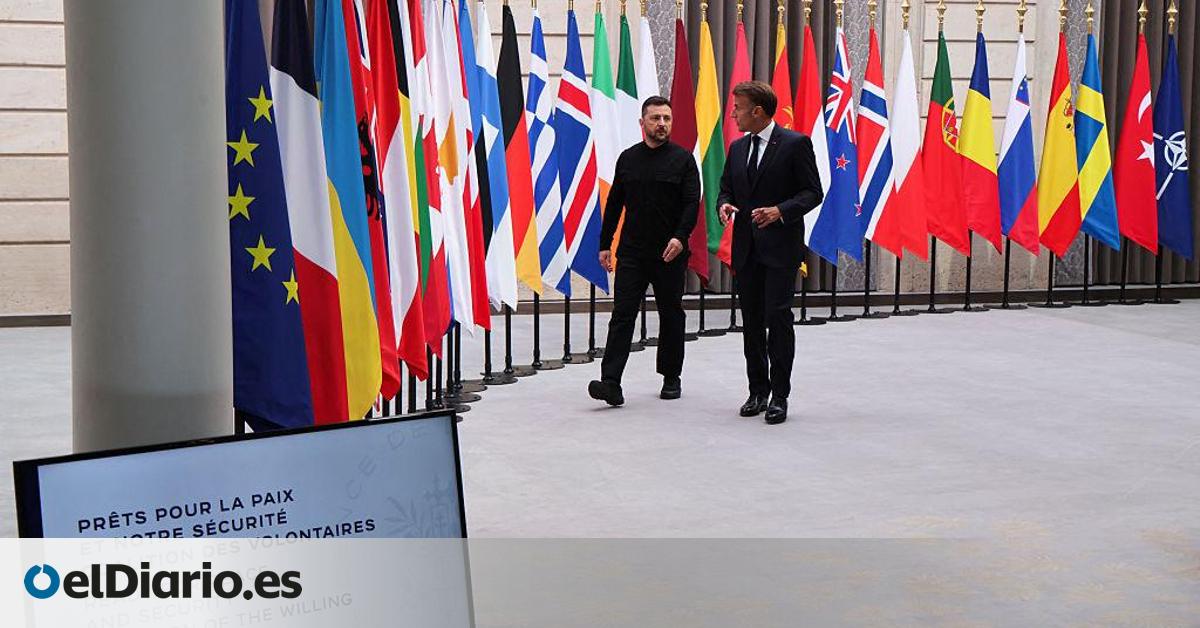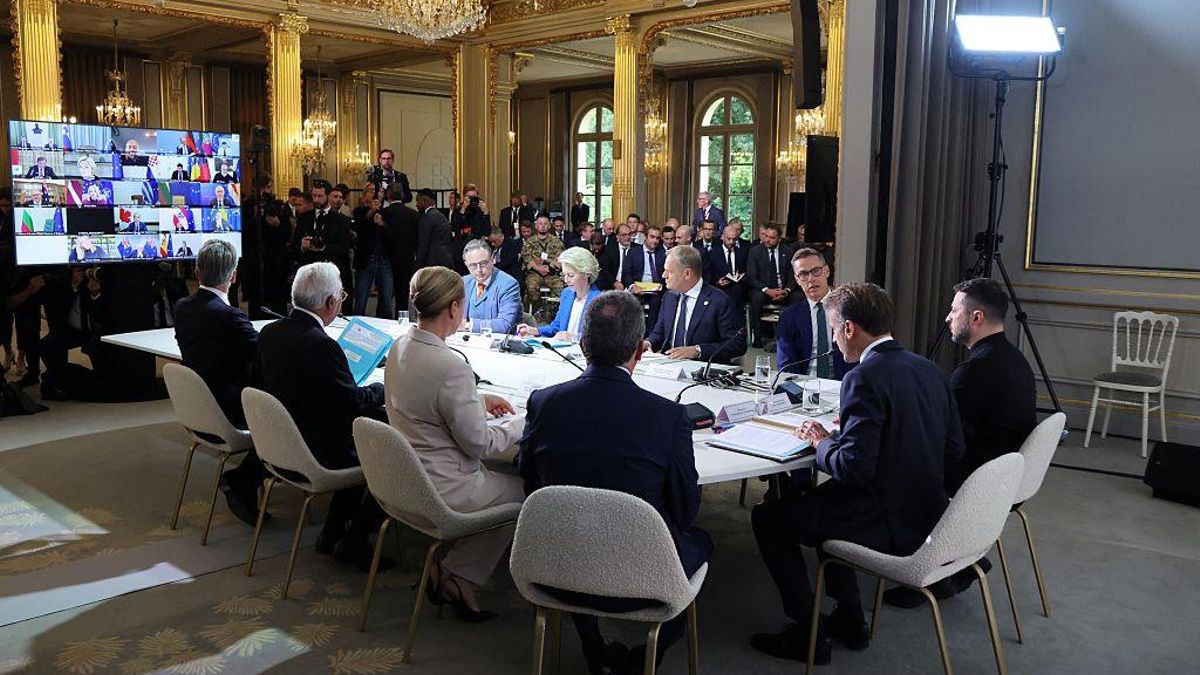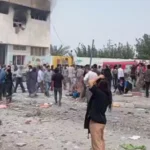
European leaders promise that they will offer “solid” protection to Ukraine to prevent future attacks by Russia if there is any agreement to stop the war now. The French president, Emmanuel Macron, said after the “coalition of willing” this Thursday in Paris that 26 countries around the world-the majority European-will participate in a possible force that unfolds in Ukraine as part of “security guarantees” to avoid future attacks. Details and a clear commitment from the United States are still missing.
“We are ready,” Macron said at a press conference, along with Volodimir Zelenski, the Ukrainian president. It is about supporting the Ukrainian army with training and preparing a “security force” with troops in Ukraine or presence by land, sea and air in the region, and in no case will be close to the front line because it does not want to face Russia.
“We have the capacity to contribute the means to renew the Ukrainian army so that it can resist any new attack, but also to deter Russia from any new aggression,” he said. This plan would be deployed as part of a hostilities cessation agreement, which could be the form of a fire or a more permanent peace agreement.
The French president said that preparations with military, political and legal details will be in a text that will be presented “in the next few days”, in the absence of specifying what the United States can do. The 26 countries that Macron speaks could contribute troops, but also other type of logistical or intelligence support. The French president did not want to give details about whether France will contribute soldiers and how many.
The British prime minister, Keir Starmer, who is the other great promoter of this coalition and this time he joined the meeting on the phone from Scotland, also said that “fast plans” of the defense leaders of the countries arranged to “ensure that a force can be deployed in case of a high fire” are also being made. But once again he insisted on the importance of the United States offering some kind of support for a mission.
The position of President Donald Trump is still ambiguous. One of the key appointments of the last weeks was the urgency intervention of several European leaders in Washington to accompany the Ukrainian president, and try to have a voice in the negotiation between the US and Russia. The purpose then in particular was that Trump did not yield to all the demands of his Russian counterpart, Vladimir Putin, after his encounter in Alaska.
Trump joined the meeting on Thursday by phone, but did not give a clear indication of his participation in that possible mission that Kremlin rejects. The Europeans told him his plans, and insisted that he accept at least share information from their intelligence agencies and send drones and airplanes even if they are not manned by US pilots.
Russian oil
Trump advised Europeans to punish Russia stopping buying oil from that country and putting more pressure on China, Moscow’s ally, according to a White House spokesman, reports Reuters. Zelenski also suggested that a way of “ending the war machine” of Russia is to cut the resources.
Although they have reduced their purchases, European countries continue to acquire oil, gas and other fossil fuels in Russia, in particular Hungary, Slovakia and Czech Republic, but also Spain, Belgium and even France. In fact, the value of Russian fossil fuel purchases by the EU exceeded 2024 to financial aid given to Ukraine.
Questioned about Trump’s idea to stop buying oil from Russia, Macron said at a press conference that he supported “more effective” sanctions.
The president, at a distance
The appointment brought together one more than thirty leaders between the 10 who attended the meeting in the Elysium Palace and another 28 that connected remotely. The president of the Government, Pedro Sánchez, had planned to travel to Paris, but had to join as others at a distance after his plane had to return to Madrid for a technical problem. Among those attending the meeting in Paris, were also the representatives of the EU, António Costa and Ursula von der Leyen.
As in almost all international matters, the EU does not have a unanimous position and this coalition also needs other countries outside the organization, such as Canada, Japan and Norway, which have been willing to collaborate. According to Macron, the collaboration of 26 in the possible protection force for Ukraine is already clear, and nine other countries are thinking about it. Spain seems to be in this second group.
The Spanish government does not want to advance if it will be part of that mission, although government sources say it will participate in the “Ukraine Security Architecture” but once they “give the conditions.” “We will fulfill our aid commitments to Ukraine,” says those sources, according to Irene Castro from Madrid.
In past meetings, Sánchez said that it was soon to talk about the sending of troops to the land at a time when Russia does not give signs of pretending to end the war. “It is still soon. Although the contours are outlined, it would be premature to advance any step when the aggressor is assaulting,” says a spokesman for Moncloa, who argues that Spain will maintain the “commitment to the allies, with the coalition of volunteers and with the stability architecture that can give security to Ukraine when the conditions are given.”

Macron said that the coalition in any case has 35 countries “willing” in a broad political sense, although so far only a few had committed themselves in public to send concrete help for that possible mission to protect Ukraine from more Russian aggressions in the future. Spain, for the moment, has not given public details of what it would be willing to contribute.
Italy has ruled out sending troops, while Baltic countries, in the first line of the Russian threat, have clearly shown their willingness to support Ukrainians.
The United Kingdom and France remain the most willing to send troops and, above all, train the Ukrainian army and continue to arm it in the future to prevent more Russian aggressions, but Germany is more reluctant to talk about commitments while there is not even a stop the fire. The German Chancellor, Friedrich Merz, refuted a few days ago to Von der Leyen, who said in an interview that Europeans already had “concrete plans” for a military deployment in Ukraine. But Macron said after Thursday’s meeting that Germany is one of the 26 countries of the possible mission.
Trump disinterest
In any case, the president of the United States has barely taken any step and seems to have lost interest in this crisis after the summit with Putin in Alaska and the meeting with the Europeans in Washington in mid -August. The two deadlines that he had established to impose sanctions on those who trade with Russia – on August 8 and September 1 – have passed without having acted in any direction.
In an interview with the CBS, Trump said Wednesday that the war in Ukraine “seems a little more difficult than others.” He also commented that he plans to speak with Putin “in the next few days.”
In fact, there is still no indication that Russia wants to negotiate peace and much less the withdrawal of her troops from the areas she has held from the country, and Putin has not accepted the meeting with the Ukrainian president, against what, according to Trump, had told him.
Meanwhile, Russia has intensified its attacks against civilians in Ukraine, with bombings daily throughout the country, also in kyiv, which suffered one of the worst attacks in months on August 28. That morning at least 23 people died in the Russian bombings, which also reached the delegation of the European Union in the capital and the British Council.
Source: www.eldiario.es

